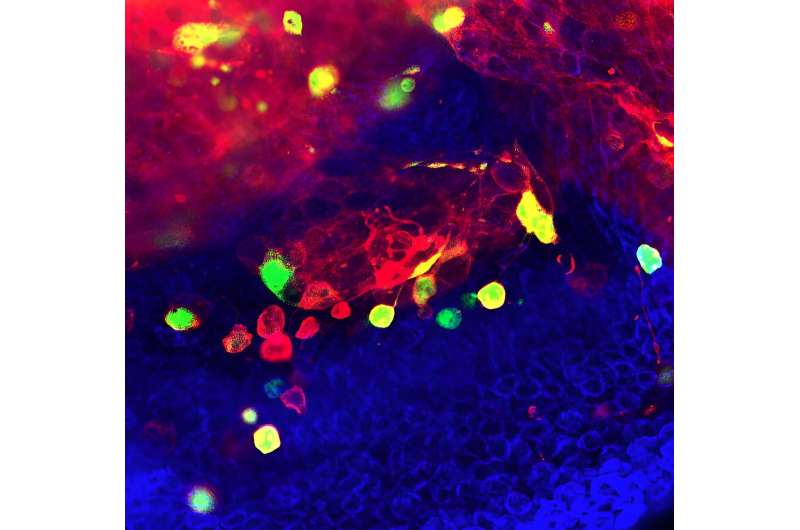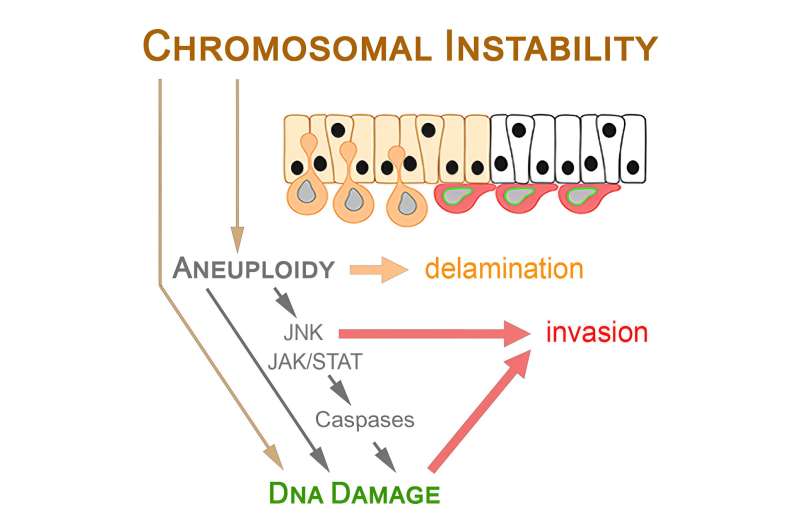This article has been reviewed according to Science X's editorial process and policies. Editors have highlighted the following attributes while ensuring the content's credibility:
fact-checked
peer-reviewed publication
proofread
Chromosomal instability in cancer cells causes DNA damage and promotes invasiveness: Study

Chromosomal instability is a phenomenon characterized by rapid changes in the number and structure of chromosomes during cell division. It is very common in solid tumors and it is linked to the aggressive spread of cancer, that is to say, metastasis. Given that metastasis causes 90% of cancer-related deaths, it is vital to unravel the details of this process.
Scientists from IRB Barcelona´s Development and Growth Control laboratory, led by ICREA researcher Dr. Marco Milan, have revealed how DNA damage caused by chromosomal instability increases the invasiveness of cancer cells. The research details how such instability activates a signaling pathway known as JAK/STAT and promotes caspase activity, which in turn causes DNA injury. This damage allows cells to escape from the primary tumor, thereby leading to metastasis. Their paper is published in the journal Current Biology.
"We have long considered caspases as agents that induce cell death in response to DNA damage. However, our findings indicate that they may also play a pro-invasive role by promoting DNA damage. This research broadens our understanding of cancer biology and paves the way to exploring new therapeutic approaches to tackle metastasis," explains Dr. Milan.

Chromosomal instability in metastatic tumors: Three side effects
Chromosomal instability, which is present in most solid tumors, promotes cancer metastasis through three pathways that occur as a secondary effect of the chromosomal instability itself: on the one hand, aneuploidy (or irregular number of chromosomes in a cell, which causes cellular stress), on the other hand, the formation of micronuclei (and the inflammatory process they trigger) and, finally, DNA damage (caused by chromosome breakage).
The laboratory led by Dr. Milan at IRB Barcelona has been studying the role of chromosomal instability in cancer and metastasis for many years. In previous studies, published in 2021 and 2018, the team explored the effects of aneuploidy on this process. In the present work, they describe the third axis of action, namely the influence of DNA damage on the invasiveness of cancer cells.
Three causes of DNA damage
Chromosomal instability can trigger DNA damage in three ways. First, the irregular segregation of chromosomes can cause a break in the DNA chain. Second, the imbalance in the number of chromosomes disrupts the cellular machinery, resulting in cellular stress during DNA replication. Third, as the researchers describe in this work, aneuploidy also stimulates the JAK/STAT signaling pathway, which in turn activates caspases and causes DNA damage.
When functioning properly, caspases drive DNA damage, leading the cell to collapse and disintegrate. However, the researchers have now detailed how lower levels of caspase activity promote DNA damage, thereby conferring cancer cells the capacity to metastasize.
More information: Lara Barrio et al, Chromosomal instability-induced cell invasion through caspase-driven DNA damage, Current Biology (2023). DOI: 10.1016/j.cub.2023.09.004
Journal information: Current Biology
Provided by Fundació Institut de Recerca Biomèdica





















